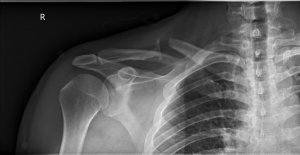- Joined
- Nov 3, 2017
- Posts
- 35
So, last Friday, I was having a fun solo day at Vail. Spent the morning and early afternoon pounding the back bowls and having a blast. About 2pm, I decided to start wending my way back over to Lionshead for an early après and much deserved beer. I’m heading down into mid-Vail on an easy but people choked blue when the light goes flat. I swerve to avoid an out of control pizza girl and hit an icy bump that I couldn’t see in the flat light. Double release on the landing and I fall. As I hit the snow, I hear a loud “pop” on my right side. I take a few moments to compose myself and realize I’m in intense pain. “Must have torn something.” I tell myself as I wave off a “host”. Back into my skis and down to mid Vail, I snap out of my skis. I bend to pick them up and realize I can’t pick them up. Ouch. Someone hands me my skis and I carry them a few feet before sitting down and looking pathetic. An employee calls patrol and a patroler comes to my aid. He quickly points to my collarbone as the culprit before helping me download the gondola.
A quick ride to Vail Health and a couple xrays later, it’s confirmed. My clavicle is in four pieces and my season is over. I’m fitted with a sling and pain meds while my wife comes to collect me. My orthopedist looks at the xrays and simultaneously schedules me for an exam and surgery.
In my exam, he notes that I’m in that gray zone where surgery is indicated, but not required. Everyone I’ve talked to has said how much better they felt post-surgery, but the doc himself says he’d probably not choose surgery for himself in this situation (a surgeon advocating against surgery?). Nevertheless, I opt for surgery.
During surgery prep, the surgical team becomes concerned about a rash on my arm where I’d been in contact with the sling. My body loves opportunistic fungal skin infections where there’s skin irritation combined with trauma elsewhere and it’d had gone wild on my arm. Anyway, surgery’s a no go and I’m sent home. That was yesterday and I’m on track to getting the rash under control. I’ve also switched from a sling to a figure 8 brace that leaves my arm free to breath.
Questions:
A quick ride to Vail Health and a couple xrays later, it’s confirmed. My clavicle is in four pieces and my season is over. I’m fitted with a sling and pain meds while my wife comes to collect me. My orthopedist looks at the xrays and simultaneously schedules me for an exam and surgery.
In my exam, he notes that I’m in that gray zone where surgery is indicated, but not required. Everyone I’ve talked to has said how much better they felt post-surgery, but the doc himself says he’d probably not choose surgery for himself in this situation (a surgeon advocating against surgery?). Nevertheless, I opt for surgery.
During surgery prep, the surgical team becomes concerned about a rash on my arm where I’d been in contact with the sling. My body loves opportunistic fungal skin infections where there’s skin irritation combined with trauma elsewhere and it’d had gone wild on my arm. Anyway, surgery’s a no go and I’m sent home. That was yesterday and I’m on track to getting the rash under control. I’ve also switched from a sling to a figure 8 brace that leaves my arm free to breath.
Questions:
- Anyone want to weigh in on whether I avail myself at another chance for surgery next week? (Already offered by orthopedist)
- Downsides to not having surgery, in terms of long term mobility and recovery?
- Your experiences post recovery, including PT and impact on sports/activities, especially skiing, hiking, and weight training.


